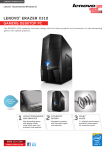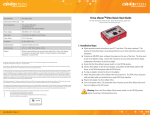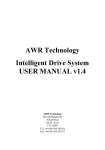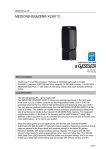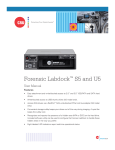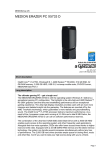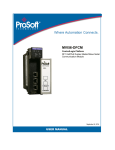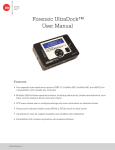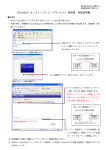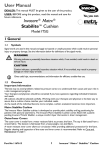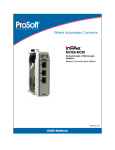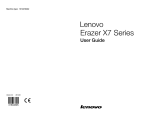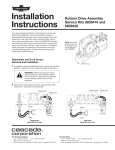Download A9-000-0029 Rev 2.1_DEU_user_manual
Transcript
Table of Contents 1.2 Identifying Parts 2 2 2 3 3 3 3 3 4 4 5 5 5 5 6 6 6 7 9 1. Pre-Setup 1.1 Drive eRazer Ultra Accessories 1.2 Identifying Parts 2. Setup 3. Menu Structure and Usage 3.1 Home/Start Erasing 3.2 Review Settings 3.2.1 Erase Type 3.2.2 HPA/DCO Handling 3.2.3 Validation 3.2.4 Label Printer Output 3.2.5 Reset to factory 3.3 View Drive Info 3.4 View Dock Info 3.5 Other Screens During the Erasure Process 3.5.1 Operational Status 3.5.2 Error Indication 4. Frequently Asked Questions 5. Technical Specifications Take a moment to familiarize yourself with the parts of your new Drive eRazer. This will aid you in the remaining steps. eSATA connection for connecting SATA drives 4-pin square connection for drive power cable 40-pin IDE header for external IDE cable attachment DB9 connector for Serial connection for printer output USB B type connector 1. Pre-Setup 1.1 Accessories Check the accessories packaged with your Drive eRazer Ultra. Please contact CRU if any items are missing or damaged. The box should include: Contains Drive eRazer unit AC adapter Metal drive plate Packet of screws and bumpers Number 1 1 1 1 SATA power/data cable IDE/PATA power cable IDE/PATA data cable Quick Start Guide and warranty info 1 1 1 1 LCD Error LED (red) Power output status LED (green) Disk access LED (amber) Power output status LED (green) HPA/DCO Indication LED (green) DC +12V input from AC adapter Navigation buttons Power switch CRU Mark Page 2 10.25.12 PMS 711 2 cyan 2. Setup a) Attach protective metal drive plate to your 3.5” hard drive. (This step is optional.) The purpose of the bottom plate is to provide protection to your drive electronics and aid heat dissipation. b) If erasing an IDE/PATA drive, configure the jumpers on the rear of the drive. The drive must be set to the Master setting. Consult the instructions or your drive (some drives display configuration information on the drive’s label). c) Ensure that the Drive eRazer’s power switch is in the OFF (0) position. d) Connect Drive eRazer to the drive (or adapter) using either the IDE ribbon cable for IDE drives or the SATA data/power cable for SATA drives. When Quick Erase is complete, Drive eRazer will verify a sample to ensure completion. See section 3.2.3 for more information on verification. PREPARING VERIFY VERIFY DONE VERIFY . . .2% 39M REMAINING > REVIEW SETTINGS > From this screen, the user can choose the erase type, set HPA/DCO handling, set the sample size for validation, and select the printer output. 3.2 Review Settings e) If using an adapter, connect the drive to the adapter. 3.2.1 Erase Type f) Attach the power cable to Drive eRazer Ultra and to the drive. For SATA drives, the power cable and data cable are combined into a single SATA drive interface. • From the “Review Settings” screen, press ENTER to get to the “Erase Type” screen. g) Plug the AC adapter into Drive eRazer Ultra. h) Turn on the power switch. The connected drive will power up and Drive eRazer Ultra main menu will appear on the LCD screen ERASE TYPE > • The current erase mode will display, along with an option to change the setting. Press ENTER to change. QUICK ERASE CHANGE SETTING? > WARNING: Ensure that Drive eRazer Ultra’s power switch is in the OFF (0) position before connecting a drive. • Press the UP and DOWN buttons to scroll through the different options. Press ENTER to select the erase mode you want to use. 3. Menu Structure/Usage of Drive eRazer Ultra Use the LCD and 4-button navigation interface to start erasing, adjust settings, view information about the drive and dock, or check on operational status. On the 4-button navigation interface, UP and DOWN allow scrolling through options, while ENTER selects and BACK goes back to the previous screen. When asked if you want to save a setting as the default, the ENTER button saves as default. Pressing UP or DOWN continues without saving the selection as default. 3.1 Home/Start Erasing Use this screen to begin the erasure process using current settings. “Quick Erase” is the default erasure setting. Quick Erase uses all zeroes as the overwrite pattern. START ERASING QUICK ERASE > ESTIMATING ERASE TIME WILL ERASE ALL DATA > ERASING. . . 2% 19 M REMAINING CHANGE MODE TO CUSTOM ERASE > • After you select the mode, you will be prompted to make your selection the default mode. Pressing ENTER saves the mode as the default. Pressing UP or DOWN sets and continues without saving the mode as default. CUSTOM ERASE MAKE DEFAULT? > 3.2.1.1 Erase Specifications Supported: Drive eRazer Ultra offers user flexibility with over a dozen preset erase methods. Use the following chart to help select which erase specification to use. Spec Explanation QUICK ERASE Performs single pass writing all zeroes CUSTOM ERASE Performs 1 to 99 passes (userselectable), overwriting with zeroes or a user-selected pattern. On every other pass, the complement (inverse) of the selected pattern will be used, but the last pass will always use the user-defined pattern. CRU Mark Page 3 10.25.12 PMS 711 2 cyan RANDOM ERASE Performs 1 to 99 passes (user-selectable), overwriting with a randomly generated 32-bit pattern. A new pattern is generated for each pass. SECURE ERASE N Initiates the drive’s built-in Secure Erase (Normal) function. Per the ATA specification, this function overwrites all addressable areas using zeroes. HPA or DCO areas are excluded per the spec, but Drive eRazer Ultra will unhide such areas prior to initiating Secure Erase if the user has changed the HPA/DCO behavior in the Settings menu. Secure Erase is better able to handle bad blocks compared to other erase methods. SECURE ERASE E Initiates the drive’s built-in Secure Erase (Enhanced) function. This is similar to Secure Erase Normal, except that HPA and DCO areas are erased (without being removed), and instead of all zeroes, a repeating pattern is used. The pattern is set by the drive manufacturer. DOD CLEAR US Department of Defense (DoD 5220.22-M) “Clear” standard DOD SANITIZE US Department of Defense (DoD 5220.22-M) “Sanitize” standard NIST80088 CLEAR “Clear” standard defined by the National Institute of Standards and Technology’s Guidelines for Media Sanitization special publication 800-88 NIST80088 PURGE “Purge” standard defined by the National Institute of Standards and Technology’s Guidelines for Media Sanitization special publication 800-88 CSEC ITSG-06 Canadian data sanitization standard HMGIS5 BASELINE Great Britain’s “Baseline” drive erasure standard HMGIS5 ENHANCED Great Britain’s “Enhanced” drive erasure standard DSD ISM 6.2.92 Australian government’s data sanitization standard. Also satisfies New Zealand’s GCSB NZISM 2010 standard. Removes HPA or DCO areas, then performs a single pass of a random pattern (three passes for drives smaller than 15GB). VERIFY ONLY Does not erase anything. Performs the verification step only. 3.2.1.2 Custom Erase: If this mode is selected, the user may select the pass count number, overwrite type, and overwrite pattern. After an erase mode is selected, you can make it the default. ENTER saves as the default. UP or DOWN sets and continues without saving the selection as the future default. # OF PASSES 01 > DATA PATTERN 00000000 > CUSTOM ERASE MAKE DEFAULT? > 3.2.2 HPA/DCO Handling Erase modes Quick Erase, Custom Erase, Secure Erase N, and Secure Erase E allow the user to select how hidden areas (HPAs and DCOs) are handled during the erasing process. • From the “Review Settings” screen, press ENTER and then UP or DOWN to get to the HPA/DCO Handling screen. Press ENTER. HPA/DCO HANDLING > • The current HPA/DCO handling setting will display, along with an option to change the setting. Press ENTER to change. UNLOCK ALL CHANGE SETTING? > • Use the UP and DOWN buttons to scroll through the handling options: unlock all, unlock HPA only, and ignore all. Press ENTER to select. CHANGE TO UNLOCK HPA ONLY > • After you select the handling, you will be prompted to make your selection as the default. Pressing ENTER saves the mode as default. Pressing UP or DOWN sets and continues without saving as default. IGNORE ALL MAKE DEFAULT? > 3.2.3 Validation: The user may select the level at which the Drive eRazer verifies the erasure process at completion. The options are Minimal (factory default selection), Medium, and High. This validation process offers a basic level of assurance that the erasure was successfully completed. Note: some erase specifications recommend or require that a separate tool be used for validation. • From the “Review Settings” screen, press ENTER, and then UP or DOWN to get to the “Validation” screen. Press ENTER. VALIDATION > • The current validation setting will display, along with an option to change the setting. Press ENTER to change. MINIMAL CHANGE SETTING? > • Use the UP and DOWN buttons to scroll through the verify options: MINIMAL, MEDIUM, or HIGH. Press ENTER to select. CHANGE VERIFY TO MEDIUM > • After you select the validation you will be prompted to make your selection the default. Pressing ENTER saves the mode as the default. Pressing UP or DOWN sets and continues without saving as default. MEDIUM MAKE DEFAULT? > CRU Mark Page 4 10.25.12 PMS 711 2 cyan 3.2.4 Label Printer Output Drive eRazer Ultra features a DB9 null-modem serial connection for the purpose of connecting a label printer. This will allow Drive eRazer to print a label recording details of an erase process. This occurs at the end of the process. The label can then be affixed to the drive, or to a DriveBox™ anti-static storage case. There are two output modes, one for a 4” x 1” label and one for a 4” x 6” label. You may also print a label as a test without an erasure process. • From the “Review Settings” screen, press ENTER and then UP or DOWN to get to the “Printer Output” screen. Press ENTER. > • The current Printer Output setting will display, along with an option to change the setting. Press ENTER to change, or UP or DOWN to print a test label. PRINT TEST LABEL > • Use the UP and DOWN buttons to scroll through the printer options: Small Label 4x1 or Large Label 4x6. Press ENTER to select. CHANGE LABEL TO LARGE LABEL 4x6 > • After you select the printer option, you will be prompted to make your selection the default. Pressing ENTER saves the mode as the default. Pressing UP or DOWN sets and continues without saving as default. LARGE LABEL 4x6 MAKE DEFAULT? > 3.2.5 Reset to Factory > 3.3 View Drive Info This screen displays information about the attached drive. • From the “Home/Start Erasing” screen, press the UP or DOWN buttons to get to the “View Drive Info” screen. Press ENTER. VIEW DRIVE INFO • Use the UP or DOWN buttons to scroll through and view the following info about the drive. Appearance on LCD Capacity (Bytes) Manufacturer Model number Serial number Firmware Rev HPA size (Bytes) DCO size (Bytes) Disk health Secure Erase Nor time From this screen, you can reset the settings on Drive eRazer Ultra to the factory defaults. Function Erase Mode HPA/DCO Handling Validation Label Printer Output CONTINUE > PRINTER OUTPUT SMALL LABEL 4x1 CHANGE SETTING? > • At the next screen, press ENTER to continue. The settings are now reset to the factory defaults. Factory Default Setting Quick Erase Ignore All Minimal Small Label 4x1 • From the “Review Settings” screen, press ENTER and then UP or DOWN to get to the ”Reset to Factory” screen. Press ENTER. Secure Erase Enh time Start/Stops Power cycles Bad sectors Explanation Capacity of the HDD, measured in bytes. Manufacturing company name of the HDD. Model number of the HDD. Serial number of the HDD. Firmware revision number of the HDD . The size of the Host Protected Area of the HDD, measured in bytes. The size of the Device Configuration Overlay of the HDD, measured in bytes. Displays the S.M.A.R.T. health status of the drive. Time reported by the drive that it will take to use Secure Erase (Normal). Time reported by the drive that it will take to use Secure Erase (Enhanced). S.M.A.R.T. information on how many times the drive has spun up and spun down. S.M.A.R.T. information on how many power on/off cycles the drive has underwent. Number of bad sectors reported by the drive. RESET TO FACTORY > CRU Mark Page 5 10.25.12 PMS 711 2 cyan 3.4 View Dock Info (continued) This screen displays information about your Drive eRazer unit. • From the “Home/Start Erasing” screen, press the up or down buttons to get to the “View Dock Info” screen. Press ENTER. VIEW DOCK INFO: Appearance on LCD Condition/Explanation PREPARING VERIFY DEU is checking user settings and planning the verification process. 3.5.2 Error Indication If Drive eRazer Ultra encounters any errors, a brief explanatory message displays. Examples are below. > • Use the UP or DOWN buttons to scroll through and view the following info about Drive eRazer. Appearance on LCD Condition/Explanation Product Name Brand name of the product (e.g. “Drive eRazer Ultra”) Unique ID# A specific, unique number assigned to the unit for identification, akin to a serial number. Firmware ver. # Minimal Label Printer Output Specific firmware version installed on the Drive eRazer product. 3.5 Other Screens During the Erasure Process 3.5.1 Operational Status During erasure, status messages are displayed on the LCD. Examples are below. Appearance on LCD Condition/Explanation PASSWORD ERROR DEU tried to reset the password on the drive, but was unable to do so. Received an error from the drive. CAN'T RESET PASSWORD Password reset was thought to have been successful, but a subsequent double-check detected that the password was still present. FACTORY < min. Drive suspected of reporting bogus information. DCO size appears to be unreasonably large, leaving less than 5MB of disk capacity. NATIVE < min. Drive suspected of reporting bogus information. HPA size appears to be unreasonably large, leaving less than 5MB of disk capacity. BLOCKCNT < min. Drive suspected of reporting bogus information. Drive’s factory capacity appears to be less than 5MB. Appearance on LCD Condition/Explanation STARTING ERASURE Displays briefly when user first selects “start erasing” and then confirms that selection. HPA RESET ERROR Failed first attempt to remove HPA. GATHERING INFO Displays briefly while DEU is gathering information from the drive and making calculations to determine such things as the presence of an HPA or DCO. HPA RESET FAILED HPA was thought to have been removed, but a subsequent double-check found it to be still present. PREPARING ERASE Displays briefly while DEU is checking user settings and planning the erase. DCO RESET ERROR Failed first attempt to remove DCO. ESTIMATING ERASE TIME DEU is wiping a portion of the drive (for 1 minute) for the purpose of estimating how long it will take to erase the whole drive. DCO RESET FAILED PASSWORD RESET (Shown briefly.) DEU is about to reset the password. DCO was thought to have been removed, but a subsequent double-check found it to be still present. PASSWORD RESET CYCLE POWER Drive’s password was successfully reset. User must turn off DEU and then turn it back on. SECURE ERASE NOR NOT SUPPORTED Drive does not support the “Secure Erase (Normal)” feature. SECURE ERASE NOR ERROR An error occurred during the Secure Erase (Normal) process. HPA RESET HPA was successfully removed. SECURE ERASE ENH NOT SUPPORTED DCO RESET DCO was successfully removed. Drive does not support the “Secure Erase (Enhanced)” feature. VERIFY DONE The erase process and verification completed successfully. ERASE DONE The erase process completed successfully; verification not available (only seen with Secure Erase modes). CRU Mark Page 6 10.25.12 PMS 711 2 cyan (continued from previous page) Appearance on LCD Condition/Explanation SECURE ERASE ENH ERROR An error occurred during the Secure Erase (Enhanced) process. WRITE CMD ERROR DEU received an error while attempting to write to the drive. READ CMD ERROR DEU received an error while attempting to read from the drive. VERIFICATION ERROR A block on the drive doesn’t match what was supposed to have been overwritten there. 4. Frequently Asked Questions (FAQ) Q: How does Secure Erase work? A: Secure Erase is a feature on many modern hard drives (greater than 15GB). This feature is activated by a low level command to the drive and causes the drive to erase itself using methods developed by the drive manufacturers in conjunction with the NSA. To protect against malware attacks, operating systems such as Windows and Mac OS (and software applications written for these operating systems) cannot send this command, but Drive eRazer Ultra can. Secure Erase sequentially overwrites the data on the drive, similar to Drive eRazer’s other erase modes. However, Secure Erase better handles data on “bad blocks” (single pass may stop and report an error at a bad block). Secure Erase is implemented on most drives that were manufactured in 2001 or later. However, an estimated time for completion was not added until later. Some drives therefore support Secure Erase but will not give an estimated completion time. Q: How fast will Drive eRazer Ultra erase the data on my drive? A: Drive eRazer Ultra can erase modern hard drives at up to 7GB/minute or more. The erasure time depends on several factors. Older drives will generally take longer than newer ones. Higher levels of verification will not affect the time spent erasing, but will make the total process take longer. Finally, the erase mode plays a role. Quick Erase will generally finish a little faster than Secure Erase. Q: Do I have to jumper my IDE drive to a particular setting? A: We recommend that you jumper your IDE/PATA hard drives to a MASTER setting. Some hard drives have two different MASTER settings: one for when there is a SLAVE drive present and one for when there is NO SLAVE drive present. Choose the setting for NO SLAVE present. There may be some drives that will not work with either of these settings. The next choice is CABLE SELECT. If this does not work, try using NO jumpers. This may be the same as MASTER with NO SLAVE present. Q: What kind of printer should I use with Drive eRazer Ultra? A: Drive eRazer Ultra was tested primarily with Zebra brand printers compatible with ZPL II formatted text (often indicated by –Z at the end of the model number). During development we made every effort to make this feature as compatible as possible, but no list of compatible printers is currently being published. If choosing a new printer, the Zebra product line is a good starting point. Feel free to contact WiebeTech for up-to-date information about Drive eRazer Ultra and serial printers. Q: What kind of cable do I need for the Printer Port? A: The printer port is a standard 9-pin serial RS-232 port. Drive eRazer Ultra requires a male end and most printers also require a male end. If you need to source a new cable, what you need is probably a “Male to Male RS-232 (DB9) Null Modem Serial cable.” Check your printer’s documentation regarding serial cable types. Connecting it to a computer’s serial port is possible with a “Male to Female RS-232 (DB9) Null modem serial cable”. Q: What sizes are the labels that Drive eRazer Ultra prints? A: Drive eRazer Ultra can print one of two different label sizes: 4”x1” or 4”x6”, depending upon how it’s configured. Q: What information is included on each label that Drive eRazer Ultra prints? A: Below are examples of the two types of labels that Drive Eraser Ultra generates. 4” x 1” label Q: With what drive capacities is Drive eRazer compatible? A: Drive eRazer cannot erase extremely small drives or media that are less than 10,000 sectors. Assuming a 512 byte sector size, 10,000 sectors is less than 5MB. There is currently no known limit to how large of a disk Drive eRazer will erase. As of September 2011 Drive eRazer has been tested with up to 3TB hard drives. We have no reason to believe Drive eRazer will not continue to work with newer and larger drive sizes as they are released. CRU Mark Page 7 10.25.12 PMS 711 2 cyan (continued from previous page) 4” x 6” label The SSD’s controller may instead remap that physical sector to a new logical sector, leaving the data intact but inaccessible. Even a full overwrite of a SSD may therefore not result in a fully wiped drive. However, the data remaining on the drive would not be accessible via normal means. Recovering such data would require removing the actual flash chips from the SSD’s circuit board and accessing them with special equipment and software tools. Secure Erase modes offer the best chance of fully erasing an SSD because they use the drive’s built-in erasing function. Secure Erase is defined by the ATA specification and requires drives to fully erase all user accessible data areas when the command is received. The Enhanced version also erases any data within HPA or DCO areas. However, at least one study has shown that some SSD manufacturers did not correctly follow at least this portion of the ATA specification. So, while some SSDs will be erased fully by Secure Erase, others may not. If you know that a particular SSD model correctly implements Secure Erase modes per the ATA spec, these modes can erase the SSD completely. If you’re unsure, you should assume that data fragments could remain. Q: My Drive eRazer Ultra shows “WRITE CMD ERROR” on the LCD and the erase has stopped progressing. What do I do next? Q: Why does the USB connector look like USB 3.0 but the documentation says it’s USB 2.0? A: Drive eRazer Ultra uses a USB 3.0 style connector because it shares a form factor and many parts with another product. However, the controller chip that drives DEU’s USB connection supports USB 2.0 only. The port can be used with either USB 2.0 or 3.0 type cables and with either USB 2.0 or 3.0 hosts, but it will operate at USB 2.0 speed. The intended purposes of the port are the previewing of a drive and firmware upgrading, rather than for lengthy data transfers. For these two purposes USB 2.0 speed is sufficient. Q: Can I switch drives or attach a hard drive when the unit is turned on? A: This is not recommended, because it could cause an electrical short that could damage the Drive eRazer ultra or the drive. Q: Will Drive eRazer Ultra work with a Solid State Drive (SSD)? A: Short answer: SSDs erased by DEU in any mode would be safe from casual data retrieval attempts, but for very sensitive data the only way to guarantee security is to physically destroy the drive. A: This message means that the drive reported an error when attempting to execute a write command sent to it by DEU. Several things can cause such an error, such as a bad block on the drive, or a poor physical connection between DEU and the drive. It may occur if the drive or dock is moved or bumped during the erase process. This is an unrecoverable error (indicated by the lighting of the Red “Error” LED). The next step is to turn off DEU’s power. If you like, you can turn DEU back on and attempt to erase the drive again. A bad block is not always 100% bad, so sometimes a block that fails to be overwritten on one attempt will succeed on the next try. Make sure the cables connecting the drive and DEU are fully seated, and do not attempt to move the drive, DEU, or cables during the erase process. Make sure the drive has good air flow around it to avoid any possible heat issues. If you continue to see this error message on the drive, the next thing to try is changing to Secure Erase Enhanced mode. This mode doesn’t use write commands; rather, it issues a single command to the drive that causes the drive to erase itself. This mode handles bad blocks better than modes based on write commands. If none of these remedies work, the only way to ensure there are no recoverable data remaining on the drive is to physically destroy it. Longer answer: With SSDs, the host (such a computer or Drive eRazer) does not have direct access to the sectors on the drive. There is therefore no way to guarantee that a command to erase a given sector will actually erase that sector. CRU Mark Page 8 10.25.12 PMS 711 2 cyan Q: My department requires 100% verification of erasure. Does the “high” option verify 100% of the drive? A: No, although the “high” checks a large number of sectors of the drive, performing 100% verification would require a much greater amount of time than the erasure process itself. For this reason, and for the security of having an independent tool, we recommend using a 3rd party tool for 100% verification. Many organizations actually require that the erase tool and the verification tool be separate products. The Australian Government Information Security Manual, November 2010, states that “Verifying the sanitisation of media with a different product to the one conducting the sanitisation process provides an independent level of assurance that the sanitisation process was conducted correctly” (161). If it satisfies your department’s requirements, you could use a hex editor, such as HxD, to visually inspect the contents of the drive to verify that it was erased. Technical Specs Product name Drive eRazer Ultra Drive Compatibility 2.5” and 3.5” SATA drives 3.5” IDE/PATA drives Additional drives using optional adapters Able to Detect & Erase HPA & DCO Areas Yes Host Connections One USB 3.0 B-type connector (operates as USB 2.0) One DB9 connector (female; serial connection for printer output) LEDs Power input status (green) Power output status (green) HDD access (amber) HPA/DCO indication (green) Error state (red) LCD Panel 16x2 backlit display Erasure Speed Drive write speed dependent. Up to 7GB/min in modern drives. Label Output 4” x 1” (summary label, drive size) 4” x 6” (form based on DoD certification of erasure document) Power Supply 100-240VAC +12V / 3A (included) Power Input +12V 3A from AC adapter via +12V DC Jack Power Output +12V / +5V to drive Compliance CE, FCC, RoHS, C-Tick Shipping Weight 3 pounds, including AC adapter Warranty: 3 Years Support Your investment in CRU products is backed up by our free technical support for the lifetime of the product. If you need to contact us for any reason, please visit cru-inc.com/support or call us at 1-800-260-9800 or +1-360-816-1800. © 2012, 2014 CRU Acquisition Group, LLC. ALL RIGHTS RESERVED This User Manual contains proprietary content of CRU Acquisition Group, LLC (“CRU”) which is protected by copyright, trademark, and other intellectual property rights. Use of this User Manual is governed by a license granted exclusively by CRU (the “License”). Thus, except as otherwise expressly permitted by that License, no part of this User Manual may be reproduced (by photocopying or otherwise), transmitted, stored (in a database, retrieval system, or otherwise), or otherwise used through any means without the prior express written permission of CRU. Use of the full Drive eRazer Ultra is subject to all of the terms and conditions of this User Manual and the above referenced License. CRU ™ , WiebeTech®, etc. (collectively, the “Trademarks”) are trademarks owned by CRU and are protected under trademark law. This User Manual does not grant any user of this document any right to use any of the Trademarks. Product Warranty and Limitation of Liability: Product Warranty CRU warrants this product to be free of significant defects in material and workmanship for a period of 3 years from the original date of purchase. CRU’s warranty is nontransferable and is limited to the original purchaser. Limitation of Liability The warranties set forth in this agreement replace all other warranties. CRU expressly disclaims all other warranties, including but not limited to, the implied warranties of merchantability and fitness for a particular purpose and non-infringement of third-party rights with respect to the documentation and hardware. No CRU dealer, agent, or employee is authorized to make any modification, extension, or addition to this warranty. In no event will CRU or its suppliers be liable for any costs of procurement of substitute products or services, lost profits, loss of information or data, computer malfunction, or any other special, indirect, consequential, or incidental damages arising in any way out of the sale of, use of, or inability to use any CRU product or service, even if CRU has been advised of the possibility of such damages. In no case shall CRU’s liability exceed the actual money paid for the products at issue. CRU reserves the right to make modifications and additions to this product without notice or taking on additional liability. FCC Compliance Statement: “This device complies with Part 15 of the FCC rules. Operation is subject to the following two conditions: (1) This device may not cause harmful interference, and (2) this device must accept any interference received, including interference that may cause undesired operation.” This equipment has been tested and found to comply with the limits for a Class A digital device, pursuant to Part 15 of the FCC Rules. These limits are designed to provide reasonable protection against harmful interference when the equipment is operated in a commercial environment. This equipment generates, uses, and can radiate radio frequency energy and, if not installed and used in accordance with the instruction manual, may cause harmful interference to radio communications. Operation of this equipment in a residential area is likely to cause harmful interference in which case the user will be required to correct the interference at this own expense. In the event that you experience Radio Frequency Interference, you should take the following steps to resolve the problem: 1) Ensure that the case of your attached drive is grounded. 2) Use a data cable with RFI reducing ferrites on each end. 3) Use a power supply with an RFI reducing ferrite approximately 5 inches from the DC plug. 4) Reorient or relocate the receiving antenna. Tested to comply with FCC standards FOR OFFICE OR COMMERCIAL USE CRU Mark Page 9 10.25.12 PMS 711 2 cyan









